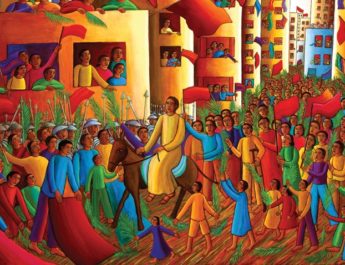Psalm 71:4-11
A Women’s Lectionary 1
4 RescueA me, O my God,B from the handC of the wicked,D
from the graspE of the unjustF and cruel.G
A “rescue” = palat. This is to escape, slip out, deliver, carry away, or calve.
B “God” = Elohim.
C “hand” = yad. This is hand, ability, power. Hand in a literal sense, but also what one can do or the means by which one does it.
D “wicked” = rasha. This is to be wicked, guilty, make trouble, do wrong. It can also be condemn, guilty, inflict punishment. This verb implies disturbing or violating.
E “grasp” = kaph. From kaphaph (to bend – from a root meaning curve or bend down). This is palm of the hand or sole of the foot, footstep, grasp. Figuratively, it can also mean power.
F “unjust” = aval. 2x in OT. From evel (injustice, wrong, moral evil, acts of violence, or unrighteousness). This is to do injustice, to distort ethics. It can also be a wrongdoer.
G “cruel” = chamets. 6x in OT. This is to be or taste sour, fermented, harsh. It can also mean dyed or of a dazzling color. It can also refer to cruelty.
5 For you, O Lord,H are my hope,I
my trust,J O Lord,K from my youth.L
H “Lord” = Adonai. From adon (lord, master, owner); root means to rule or be sovereign. This is the actual Hebrew word for Lord used (in a different form) of humans and (in the present form) of God. It means someone who is in control.
I “hope” = tiqvah. From qavah (to wait, look, gather together, bind together, collect; figuratively, to expect). This is literally a cord used to attach things. Figuratively, it’s expectation, hope, what you long for.
J “trust” = mibtach. 15x in OT. From batach (to hide for refuge, be secure or sure; figuratively, it refers to trust, being confident, or hoping). This is trust, hope, confidence. It is a refuge or assurance.
K “Lord” = YHVH. From havah (to be, become) or hayah (to come to pass, become, be). This is the name of the God of Israel, the self-existent and eternal one, the tetragrammaton. This pronunciation has been lost to time so “Lord” is generally used in its place.
L “youth” = naur. From naar (child or a servant; a child in their active years so they could be aged anywhere from infancy to adolescence); perhaps from naar (to shake, toss up and down, tumble around). This is youth or childhood.
6 Upon you I have leanedM from my birth;N
it was you who tookO me from my mother’sP womb.Q
My praiseR is continuallyS of you.
M “leaned” = samak. This is to lean, rest, support, brace, uphold, sustain, or establish. It is to lean on in a positive or negative sense.
N “birth” = beten. Root may mean to be hollow. This is the belly or womb. It can also refer to a body more broadly.
O “took” = gazah. 1x in OT. This is to cut off or take.
P “mother’s” = em. This is a mother as binding a family together or a breeding female animal. It could be mother in a literal or figurative sense.
Q “womb” = meeh. This is inward parts, belly, heart, womb, intestines, vastness. It can also be figurative for sympathy.
R “praise” = tehillah. From halal (to praise, be boastful). This is praise or a song of praise. It is to offer God a hymn, to boast in God. This shares a root with “hallelujah.”
S “continually” = tamid. May come from a word that means to stretch. This word means an indefinite period of time. So, it could be regular or daily. It could also be constantly, continually, always, or perpetually.
7 I have beenT like a portentU to many,V
but you are my strongW refuge.X
T “been” = hayah. Related to “Lord” in v5. See note K above.
U “portent” = mophet. Perhaps from yaphah (to be beautiful, decorate; root means being bright, which implies being beautiful). This is a wonder, miracle, symbol, sign, or omen.
V “many” = rab. From rabab (increasing in any aspect whether quantity, authority, size, quality, greatness, etc.). This is abundance, many, elder, exceedingly, great. It refers to abundance of amount, rank, or status.
W “strong” = oz. From azaz (to be strong, become fixed, be bold, prevail, be impudent; it means to be stout literally or figuratively. A Late Hebrew word). This is strength in the sense of force, majesty, praise, material and physical strength, the abstract notion of security. It can also speak of social or political power.
X “refuge” = machaseh. From chasah (to take refuge or flee for protection; figuratively, to hope or trust in someone or something). This is a shelter in a literal or figurative sense. It is refuge or place of refuge. It could also be hope or trust.
8 My mouthY is filledZ with your praise,
and with your gloryAA allBB dayCC long.
Y “mouth” = peh. This is mouth in a literal or figurative sense. So, more literally, it can be beak or jaws. More figuratively, it refers to speech, commands, or promises.
Z “is filled” = male. This is fill, satisfy, replenish, accomplish, fulfill, confirm, or consecrate. It is fill in a literal or figurative sense.
AA “glory” = tipharah. From paar (to beautify or adorn, to gleam; can refer to showing honor or glorifying someone; also to boast or to shake a tree for harvest). This is beautiful, splendor, adornment, honor, bravery.
BB “all” = kol. From kalal (to complete). This is all or every.
CC “day” = yom. Root may mean being hot. This is the day in a literal or figurative sense. It can also mean birth, age, daylight, continually or other references to time.
9 Do not cast me offDD in the timeEE of old age;FF
do not forsakeGG me when my strengthHH is spent.II
DD “cast…off” = shalak. This is to throw, fling, or hurl. It can also be to throw away in a literal or figurative sense.
EE “time” = et. Probably from anah (to answer, sing, announce); from ad (forever, all, old); from adah (to pass on, advance, decorate oneself). This is a period or season. It can also mean whenever or continually.
FF “old age” = ziqnah. 6x in OT. From zoqen (old age); from the same as zaqan (beard or chin – the beard represents old age); from zaqen (to be old or grow old). This is old or old age through the analogy of being bearded.
GG “forsake” = azab. To loosen, relinquish, permit, forsake, fail, leave destitute.
HH “strength” = koach. Root may mean to be firm. This is power, strength, force. It can be literal or figurative, positive or negative. It can also mean capacity or means – what something produces. Additionally, it could refer to some kind of small reptile.
II “is spent” = kalah. This is to end, be finished, complete, prepare, consume, spent, or completely destroyed.
10 For my enemiesJJ speak concerning me,
and those who watchKK for my lifeLL consultMM together.NN
11 They say, “PursueOO and seizePP that person
whom God has forsaken,
for there is no one to deliver.”QQ
JJ “enemies” = oyeb. From ayab (to hate or be hostile to). This is a foe or enemy as one that you are hostile to.
KK “watch” = shamar. This is to keep, watch, or preserve. It means to guard something or to protect it as a thorny hedge protects something.
LL “life” = nephesh. Related to naphash (to refresh or be refreshed). This is soul, self, person, emotion. It is a breathing creature. Can also refer to appetites and desires.
MM “consult” = yaats. This is to advise, counsel, consult, decide, plan, purpose, or determine. It can also have a negative sense of conspire or devise.
NN “together” = yachad. From yachad (to join, be united). This is a unit, both, altogether, unitedness, alike.
OO “pursue” = radaph. This is to chase after, pursue, hunt, or persecute. It is running after someone or something, generally with hostile motives.
PP “seize” = taphas. This is to catch, seize, wield, capture. It can also mean to use unwarrantably.
QQ “deliver” = natsal. This is to snatch someone or something away in a good sense – as rescue, defend, or deliver – or in a bad sense – as strip or plunder.
Image credit: “Scream” by Alosh Bennett, 2007.




